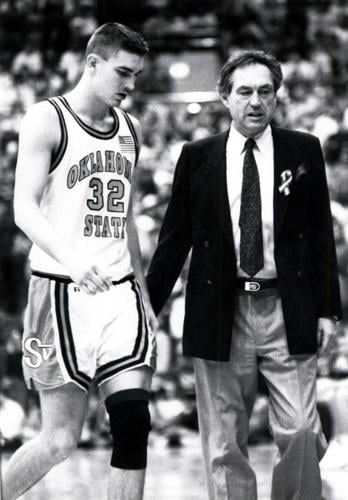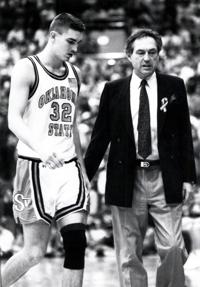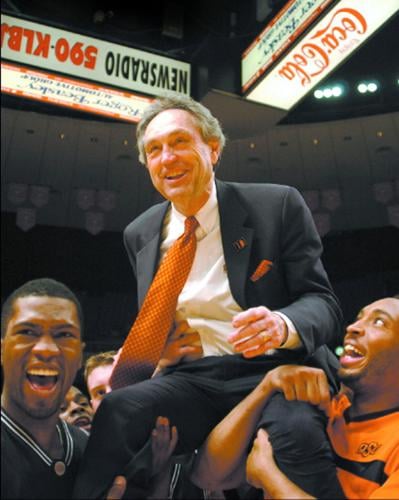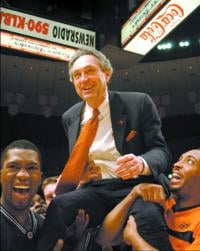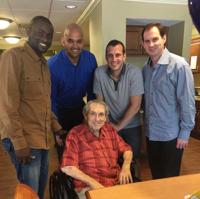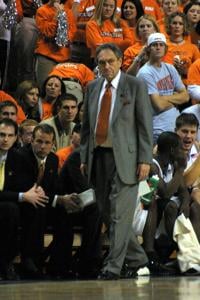Doug Gottlieb remembers what hung on the wall.
An autographed picture of Bill Clinton. A personalized note from Michael Jordan.
Brian Montonati said Eddie Sutton’s office was like a museum. Memorabilia, such as a basketball Oklahoma State’s 1995 Final Four team signed, intermixed with pictures of Sutton’s wife, Patsy, and their sons and grandchildren, filled the room.
Gottlieb and Montonati, seniors on Sutton’s 1999-00 OSU team, stopped by the office frequently during the season. It was mandatory for players to check in with a coach every day, to make eye contact and have a conversation.
“It was a place where you talked about life,” Montonati said.
The talks changed and bettered the players in the same way an art student would benefit from daily conversations with a museum curator while surrounded by a room full of signed work from Rembrandt and van Gogh.
One night, though, in the office, Sutton was the one changed by conversations.
The screams ensured it.
The crash
Jan. 27, 2001 – Scott Sutton was in a back tunnel of the Mabee Center, the Oral Roberts basketball arena, when he was informed. Scott, a current assistant coach at OSU, was the ORU basketball coach at the time. That night, his Golden Eagles had been trampled.
When the wife of assistant coach Corey Williams came running in tears to find him, thoughts of the 71-48 defeat against UMKC vanished from Scott’s mind.
On its way back to Stillwater from a game at Colorado, a plane carrying 10 men associated with the OSU basketball team, the team Scott’s father Eddie and brother Sean coached, had crashed, killing everyone on board.
Sean Sutton had just settled into his office at home. An OSU assistant coach, Sean was on the first of three team flights back from Colorado so he could break down film of the Cowboys’ 81-71 loss when his wife, Trena, called him into the kitchen and passed him the telephone.
Dad needed to talk, first delivering the tragic news.
“We have to get to the office now,” Eddie Sutton said. “We have to call these families.”
“I hung up and fell back on my kitchen floor,” Sean said. “And then the names of the people on that plane started racing through my mind.”
Those lost: two players, junior Daniel Lawson and freshman Nate Fleming; team staff members Will Hancock, Jared Weiberg, Brian Luinstra and Pat Noyes; broadcaster Bill Teegins; engineer Kendall Durfey; and pilots Bjorn Fahlstrom and Denver Mills.
Eddie could have passed off what came next, informing the families of their losses. James Halligan, OSU’s president, volunteered, along with OSU’s chaplain, to deliver the news to the loved ones.
Eddie refused, insisting he alone be the one to make every call.
“He felt a real strong obligation that he needed to be the one to deliver the news,” Sean said.
The phone calls
Eddie kept his desk neat. There might be some files off to the side or a notepad in the middle, but the legendary coach’s space was always orderly. On the night of the crash, a telephone was placed prominently on the desk.
Eddie sat in a leather chair and went through with his onerous task.
“Listening to the cries and screams on the other end as he told players’ families, managers and GA’s parents and the wives of the people on that plane… to hear the emotion and sadness was pretty devastating,” Sean said.
Sean and Harry Birdwell, OSU’s athletic director, stood with Eddie in the office, offering support and encouragement. Eddie spoke deliberately, expressing his immense sorrow to the person on the other end of the phone in explaining that his or her loved one would not be coming home.
“Each time he hung up the phone you could feel the pain that was going through his body,” Sean said.
Sean came and went that night, splitting his time between the office and the main room in the basketball office where he comforted the stunned players who trickled in. Fred Jonzen, a junior forward, was there that night.
“I can't even imagine what that would have been like,” Jonzen said of Eddie's calls to families. “It's not a fun conversation, but it is what a leader does."
The memorabilia-riddled office, with its leather sofa that couldn’t quite fit Montonati’s 6-foot-9 frame, had been the site of many difficult conversations. It was where Eddie carried out “do better” meetings with players.
“You'd go in and three assistants would be on the sofa,” Gottlieb said. “You'd sit in a chair facing coach. The three assistants, one would research what was going on in your personal life. One would do academics. And one would break down what you were doing wrong playing time wise.
"And then coach would be like, ‘Alright, now how are we going to do better?’”
Gottlieb said at the time it could feel invasive, but now knows Eddie’s dedication to every aspect of his players’ lives came from a place of caring and love.
“When you saw (Eddie) off the court, all he cared about was the person,” Jonzen said.
“That overall investment, I think is why so many guys revere not just coach, but the way in which we were coached,” Gottlieb said.
Making those phone calls that impacted so many that January night couldn't help but change Eddie.
“I don't know how it couldn't have changed his approach to interacting with people,” Jonzen said. “I think it was probably a big reminder that life is bigger than basketball.”
The change
Eddie and Sean attended every funeral.
Life went on. It had to. The Cowboys won their first game after the crash, a 69-66 victory against Missouri, and made the NCAA tournament as a No. 11 seed.
But in the days and months after the crash, the Sutton family was changed.
“I'm not sure my dad was ever the same after,” Scott said. “In some ways it mellowed him. It softened him a little bit.”

Eddie Sutton amassed over 800 wins before he retired in 2006
Not that he was cold before, but Eddie made an effort to dole out his love.
“There were very few days after that happened that he wouldn't call every single day just to check in and tell family members, in my case me, how much he loved me,” Scott said.
They would not call to talk about the crash. Instead, their father/son conversations centered on family. Eddie liked hearing about his grandkids.
After Patsy Sutton died in 2013, Scott, Sean and Steve, the oldest Sutton son, started a tradition.
Like the mandatory check-ins Eddie instituted as coach, the Suttons instituted a rule they followed religiously.
“Regardless of who is in town, regardless of who can make it, regardless of what else is going on, every single Sunday from now as long as dad is in this house we will meet here for some meal,” Steve said.
Every Sunday, from 5 to 6:30 p.m., the Suttons ate at their father’s house.
Sean said the gatherings resembled the family meals depicted in the TV show Blue Bloods, where the fictional, multigenerational Reagan family gets together for dinner at the end of episodes.
Sometimes Hideaway pizza was the main course, or Charlie’s Chicken, one of Eddie’s favorites. If the weather was nice, Steve would grill steaks, or the Suttons would cook burgers and hot dogs.
“We always made sure that at least coconut cream pie was there,” Steve said. “We would always find a place that would make them from scratch.”
There would usually be a sporting event on TV. Eddie liked watching baseball, and basketball games that had a player or coach whom he knew. He typically sat in the downstairs den off the kitchen while sipping on a Diet Pepsi.
The Suttons met weekly for seven years until Eddie Sutton’s death in 2020.
Eddie was also able to spend time with his former players after the crash, especially when his players, whom he also sometimes referred to as his sons, visited Stillwater for games.
“Even after playing and going back to visit with Coach, you'd sit in his office for hours and talk to him,” Montonati said. “Talking about family, you know, what your plans were, what you're going to be doing in five to 10 years… he was always welcoming.”

Eddie Sutton (center) in 2014 after a meal with former players Joe Adkins (left), Brian Montonati (left center), Doug Gottlieb (right center) and coach Sean Sutton
OSU honors the plane crash victims yearly with a “Remember the 10” celebration. There is a memorial in Gallagher-Iba Arena, 5K and 10K runs, and the Cowboys play a "Remember the Ten" game each year. Saturday’s game against Oklahoma will be the 21st game.
Montonati, who said his coach was big on hugs, recalls running into Eddie and Patsy at a Lionel Richie concert well after their days at OSU were over. The coach and player shared a moment.
“One thing Coach would always do when you were leaving him, he told you how much he cared about you and that he loves you… no doubt in my mind the crash had something to do with it,” Montonati said.
No one knows for sure the impact the crash had on Eddie. As many coaches do, he determined who sat in which plane on that night.
“The magnitude dialing somebody up on the telephone, a mom and a wife and telling them their son or husband is gone… I mean, there's nobody that can put their head around that,” Steve said.
Players always felt Eddie welcomed them, and his office was a good place for a conversation.
“He probably expressed his feelings and his affection for (his team) more so after (the crash),” Sean said. “Reminding them all the time how much he loved them and cared about them. He didn’t ever want them to question that."
"Never wanted it to go unsaid.”

